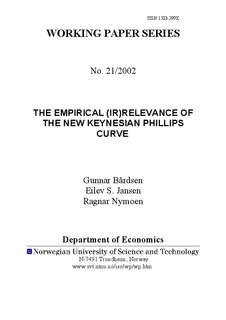| dc.contributor.author | Bårdsen, Gunnar | nb_NO |
| dc.contributor.author | Jansen, Eilev S. | nb_NO |
| dc.contributor.author | Nymoen, Ragnar | nb_NO |
| dc.date.accessioned | 2014-12-19T14:31:57Z | |
| dc.date.available | 2014-12-19T14:31:57Z | |
| dc.date.created | 2006-10-05 | nb_NO |
| dc.date.issued | 2002 | nb_NO |
| dc.identifier | 126119 | nb_NO |
| dc.identifier.uri | http://hdl.handle.net/11250/267167 | |
| dc.description.abstract | We give an appraisal of the New Keynesian Phillips curve (NPC) as an empirical model of European inflation. We show that existing evidence reported in favour of the NPC on Euro-area and country data is due to a corroborative research strategy. In particular, goodness-of-fit is a weak criterion, since the NPC-fit is well approximated by a random walk. Instead we report the outcome of more critical tests, and the importance of modelling a system that includes the forcing variables as well as the rate of inflation is emphasized. Finally, encompassing tests are applied to open economy versions of the NPC for UK and Norway. | nb_NO |
| dc.language | eng | nb_NO |
| dc.publisher | Institutt for samfunnsøkonomi | nb_NO |
| dc.relation.ispartofseries | Working Paper Series, 1503-299X; 2002:21 | nb_NO |
| dc.title | The Empirical (ir)Relevance of the New Keynesian Phillips Curve | nb_NO |
| dc.type | Research report | nb_NO |
| dc.contributor.department | Norges teknisk-naturvitenskapelige universitet, Fakultet for samfunnsvitenskap og teknologiledelse, Institutt for samfunnsøkonomi | nb_NO |
